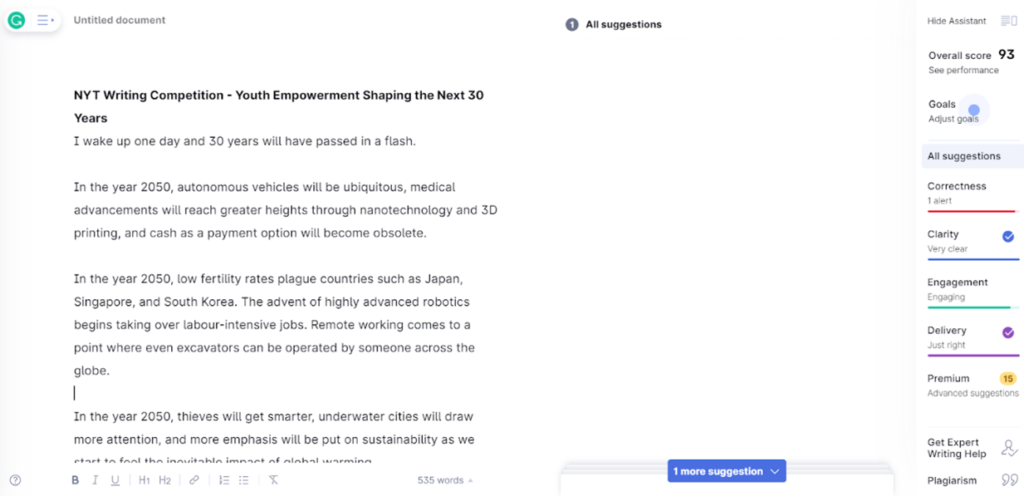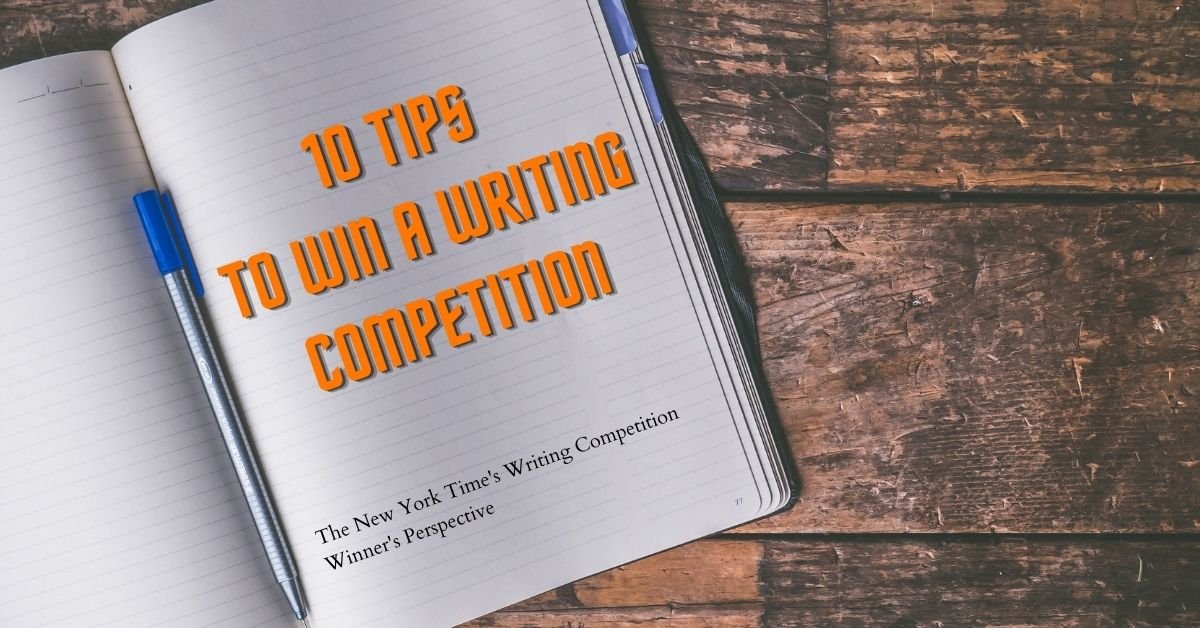
So you did it. You finally mustered up the courage to register your interest in a writing competition.
What’s next?
In this post, I’ll share my experience of participating in a New York Times (NYT) Writing Competition, why I joined, as well as 10 tips to win a writing competition.
You’ll get to learn from my experience of how I emerged as the champion in New York Time’s Asia-Pacific Writing Competition 2019.
My competition-winning piece will be placed below if you are interested to read it!
Let’s start off with my rationale for joining the NYT competition.
Jump ahead to
Why Join a Writing Competition?
Everyone has different reasons. Some may want to gain recognition, some may want writing exposure, and some may have joined out of boredom.
For me, I just wanted to give it a shot.
However, I won’t deny that it does look good on your portfolio if you win the contest.
It all started when I received this email from my school …

As someone who’s fond of writing and with spare time, I asked myself ‘Why not?’ and proceeded to register.
It was the first-ever writing competition I’ve joined, and I honestly didn’t expect much. It was all for fun and experience.
Whatever reason you may decide to join the competition, I believe that you should never submit a slipshod piece.
If you did, what is the point of signing up?
10 Tips to Win a Writing Competition
There are many types of writing competitions. It could be topic-based, literature pieces, stories, poems, and more.
Hence, these tips may not 100% apply to a specific competition you are entering. However, some tips generally stay the same for most.
The tips I’m about to share are mainly for a typical topic-based writing competition.
1. Brainstorming Comes First

Image: Kelly Sikkema
What I find extremely useful is to pen down all the main points that come to your head onto a piece of paper.
The last thing you would want to do is to immediately start writing the essay.
By writing down your thoughts in bullet points, you’ll have a clearer picture of the content to include along with improved writing flow.
Transitioning between points will be smoother, and the judges will find your piece more engaging.
Once you’ve brainstormed ideas, you can pick the most suitable points to elaborate on.
Don’t flood your essay with different messages. Focus on a few points and make them count.
Consolidate the points and convert them into impactful paragraphs.
2. Follow Instructions Carefully
Make sure you read through all the instructions carefully.
The organiser may include the judging criteria and instructions in a separate booklet.
In my case, The New York Times attached a PDF file containing all the instructions in an email.
If you are still unsure about the directions, you can always email them and enquire.
Important points to take note of is the theme, deadline (in stated time zone), format, word count, font, and font size. (usually Arial / Times New Roman 12)
Always stick to the theme.
My theme was ‘In an age where unpredictability is the new constant, what can you, the younger generation, do now to shape the future? How do you imagine our world 30 years from now?’
I broke down the question into important bolded parts and never deviated from them.
Generally, opinion pieces are written in first-person perspective (I, we) while themes are written in third-person. (They, he, she)
Avoid contractions (I’ll, would’ve). Spell it out full instead (I will, would have) because such competitions tend to be formal in nature.
I cannot emphasise how important the judging criteria is. It can make or break your essay.

Image: The New York Times Asia-Pacific Writing Competition 2019 Instruction Manual
If writing content is 65%, technique 15%, what do you think you should focus on?
Spend the majority of your time refining your content before polishing up grammar, structure, and technique. (Depends on your judging criteria.)
3. A Captivating Title Matters
Never ever use the default title unless it’s a requirement.
The title is one of the places where you’ll stand out from other competitors, so make it captivating.
No one wants to read a long and boring title!
Relate your title to the theme and the content of your essay.
My title was ‘Youth Empowerment Shaping the Next 30 Years’, staying true to the theme.
Remember to capitalise your title properly. You may use websites such as capitalizemytitle when in doubt.

4. Start Well, End Well
What if I told you the sun might disappear tomorrow?
Did I get your attention? Asking questions is a great way to get readers interested.
You need to hook readers right from the start, to make them want to read on.
The sun has a possibility of disappearing tomorrow.
Sounds less impressive, doesn’t it?
Also, do close your essay well.
You may leave them to wonder as I did, or re-emphasise points if the word count limit allows for it.
Seek to leave an impact or impression on the judge. It’s your final words to convince them that they should hand you the crown.
And no, the sun is going nowhere, at least for billions of years…
5. Write Impactful Paragraphs

Image: Glenn Cartsens-Peters
Once you’ve decided what your main idea and supporting ideas are, you can start to develop paragraphs.
Convert your points to sentences and read it out loud to see if it makes sense.
Support your points with examples and always link back. For example, I mentioned about the impact of fast fashion in my essay, how it may be a possible problem for youths to solve.
Find relevant statistics that you may want to include in your essay. Don’t include statistics for the sake of doing it.
Sentences and paragraphs should not be too lengthy. If there are too many commas in your sentence, split it into multiple sentences.
Sometimes, you may want to use sentences as paragraphs for impact. I had a paragraph with only one sentence – ‘Unpredictability looms all over the world.’
This brings me to my next point – use keywords. Part of the theme of my writing competition talks about unpredictability being the new constant. I used the same keyword, ‘unpredictability’ for my paragraph.
Focus on quality. Take however long you want within the deadline to complete your essay.
Make sure you are more than satisfied before submitting your work.
6. Keep It Simple
It is a requisite for us to demystify puzzles of Brobdingnagian proportions occluding a burgeoning civilisation.
If your sentences are constructed in such a way, you’ll confuse the reader.
Avoid incorporating too many bombastic words. People have the wrong assumption that a competition entry piece with profound words equals better writing.
If no one can understand you, how do you expect them to give you great marks?
Of course, don’t keep using the same words over and over.
Google synonyms and find out how to use them effectively in sentences.
Thesaurus is a fantastic website to find synonyms. Again, don’t use overly bombastic words!
We must solve the biggest problems and overcome gargantuan challenges standing in the way of societal growth.
Sounds better?
7. Don’t Sound Like a Robot

Image: Brett Jordan
A common mistake I see others making is throwing statistics after statistics to the audience without explanation.
Remember to only select suitable materials to elaborate on, and link back to the theme.
Don’t sound too stiff. Try to relate to the audience of your essay. You may find it handy to write as though how you’ll speak. (Again, depends on the competition itself.)
At the end of the day, it’s humans who will read through your writing.
8. Be Creative
With so many people writing the same topic, there are bound to be overlaps.
Embrace fresh or new ideas that others may not think of.
Add your personal touch and style to your essay. If your content is similar, the way you present it must be different.
Go back to Step 1 – Brainstorming to generate ideas from the knowledge that you’ve gained throughout the years.
Take inspiration by talking to others or by reading articles online. Most importantly, don’t plagiarise.
Creativity and originality are sometimes included in the judging criteria.
9. Give Credit
We’ve all learnt about the consequences and morality of plagiarism in school.
I hope no one ends up as an internet pirate who steals other people’s content. Always give credit. Add a list of references below your essay.
If the organiser of the writing competition did not state which format to use for the references, you may use whatever you learnt in school.
For me, I use APA format citations. Other formats include MLA, Chicago, IEEE, and CSE.
I usually use an auto citation generator and edit accordingly as it’s much easier.

Citation Machine is a great tool for generating citations. Just paste the URL of the page, input certain details, and you’re done.
10. Remember to Proofread
After finishing your essay, look thoroughly over it again.
Look out for sentence structure, flow, grammar, and spelling errors.
You wouldn’t want the judges to deduct points for writing “with the the advent of technology”, do you?
Apart from manually checking, I use Grammarly to catch errors I may have missed.

Grammarly not only tells you about spelling mistakes, grammar, and sentence structure, they also give you an idea of how your essay sounds.
You may also want to consult your friends or teachers about your essay.
It never hurts to get a second opinion. However, don’t blindly follow what is told to you.
Learn to accept constructive criticism and improve accordingly.
An Unexpected Win

If you put genuine effort into your work, you may be surprised to discover that you’ve won the competition.
Moreover, wouldn’t you agree that victory tastes sweeter when you work for it?
I’ll place my winning entry I’ve written below if you want to read it.
Although the much-anticipated Awards Ceremony was cancelled due to the global COVID-19 situation, I was nonetheless over the moon.
The NYT team subsequently asked for the contact information of my head of faculty and emailed them that I have won.
It was surreal when lecturers that I didn’t know started congratulating me, but I appreciate their kind words.
These were the prizes that I received:

- Champion’s plague
- Sleek mouse
- Certificate of Recognition
- Cool-looking bottle
- Published opinion piece on NYT International Edition
- Booklet of shortlisted entries
- NYT Bag
- NYT Notebook
Additionally, they provided a 4-week complimentary digital subscription to The New York Times for all participants.
The most valuable reward, in my opinion, is having my article published in a globally recognised newspaper – The New York Times International Edition.
Dealing with Worst-Case Scenarios
Picture this. You’ve submitted your competition entry but later realised that there were grammatical errors in your essay.
Sounds familiar?
Don’t panic.
Be it if you submitted the wrong copy, sent it to the wrong address, realised a typo too late, or forgot to attach a file – Be honest and email them politely.
Your email could look something like this. (Reply to the email of the wrong entry you sent them)
| Dear Sir/Madam, I am [Name], a candidate in [Competition Name]. I realised that I sent the wrong copy of my competition entry in the previous email. Attached is the correct version. Thank you for your patience and I apologise for any inconvenience caused. Yours Sincerely, [Name] |
Everyone makes mistakes. Chances are they will not deduct any points and reference the newest version.
Losing is Winning

Image: Jeremy Lapak
Nothing good comes without trying.
Don’t be disheartened if you didn’t come out on top. The judges’ individual preferences may have determined the ultimate winner.
You should seek improvement instead. For example, you could aim to get shortlisted in the next competition, attain top 3 following that, etc.
Many opportunities are waiting for you out there. A simple Google search could return multiple results of writing competitions.
It’s all about personal growth and development.
In fact, losing a competition adds to your writing experience, strengthens your vocabulary, and builds up your knowledge.
Be proud that you signed up for the writing competition and gave it your all when others procrastinate on working on their goals.
I’m sure that you’ll be able to clinch that sweet, sweet victory one day!
If you would like to gain writing exposure, share your experiences, and be featured on our website, we’ll be glad to have you.
Conclusion
If you’re reading this post, I assume that you’ve already signed up or are looking to sign up for a writing competition.
Waste no time. The experience you’ll gain may one day help you in one aspect or another.
I hope that the 10 tips will help elevate your essay and bring you one step closer to winning a writing competition.
Remember, familiarising yourself with the judging criteria will determine the content and flow of your essay, in turn increasing your chances of winning.
Lastly, I’ll like to thank Ngee Ann Polytechnic for inviting me to take part in the competition, and The New York Times for hosting the competition.
The staff over at The New York Times were very friendly and helpful. They responded to my queries diligently.
They also went the extra mile to send me a physical copy of the newspaper with my published piece when I couldn’t get it in time.
Thank you for reading this post and good luck!
My Competition-Winning Entry
NYT Writing Competition – Youth Empowerment Shaping the Next 30 Years
I wake up one day and 30 years will have passed in a flash.
In the year 2050, autonomous vehicles will be ubiquitous, medical advancements will reach greater heights through nanotechnology and 3D printing, and cash as a payment option will become obsolete.
In the year 2050, low fertility rates plague countries such as Japan, Singapore, and South Korea. The advent of highly advanced robotics begins taking over labour-intensive jobs. Remote working comes to a point where even excavators can be operated by someone across the globe.
In the year 2050, thieves will get smarter, underwater cities will draw more attention, and more emphasis will be put on sustainability as we start to feel the inevitable impact of global warming.
Unpredictability looms all over the world.
To achieve sustainability and holistic progress in the future, the younger generation has a huge role to play in developing our society. We must solve the biggest problems and overcome gargantuan challenges standing in the way of societal growth. However, before all these can happen, we must first be open-minded, seek out possibilities and experiment with new ideas.
We ought to immerse ourselves in others’ cultures and understand one another as a result of globalisation. Furthermore, upgrading our skills to value-add is of paramount importance to keep us relevant in society.
Fast fashion has always been popular mainly due to trendy and inexpensive designs. Nonetheless, this form of fashion is detrimental to the environment. Shocking statistics reveal that 2,700 litres of water are required to make a single cotton shirt. To put this into perspective, the said amount is enough to meet the average person’s drinking needs for two-and-a-half years. Bearing in mind that our freshwater supply is limited, what would be of the world if this were to continue to happen?
According to UNESCO, 264 million children have no access to education. Illiteracy is directly proportionate to poverty. If this issue is addressed, poverty would be reduced, and more opportunities can surface for the underserved.
Environmental sustainability and education are only a glimpse of major problems to be solved today. However, most people are apathetic as these concepts may seem abstract and distant to us. Since we do not feel the impacts directly, we commit the grave mistake of neglection. Moreover, businesses do not want to involve themselves in problems that add to their overhead expenses and eat away their profits.
Therefore, as part of the younger generation, we must start to make a change. We must unite and create a sustainable future. There are numerous problems to be tackled by us, and we must be open-minded and build a solid foundation for future generations to come.
The future may remain uncertain to us, but there are a variety of problems we can try solving to create a better tomorrow. Youths today will serve as a point of reference to others in the future.
Sitting at the back of a moving car, I look over the horizon as I wonder what the future holds for us in the year 2050. Perhaps I may even volunteer to be the first batch of earthlings for the Colonisation of Mars?
We’d LOVE to Feature You!
Your experiences are highly valued by others.
You Deserve to Make Better Decisions.
Receive summaries of experiences & guides, from those who’ve been there, done that.
If you like our content, we’d appreciate it if you could follow us on our social platforms!
It’ll bring us one step closer to equipping everyone with knowledge to make better decisions.
About the Author
Jonas Ngoh loves to give advice based on his experiences. Feel free to talk to him!









